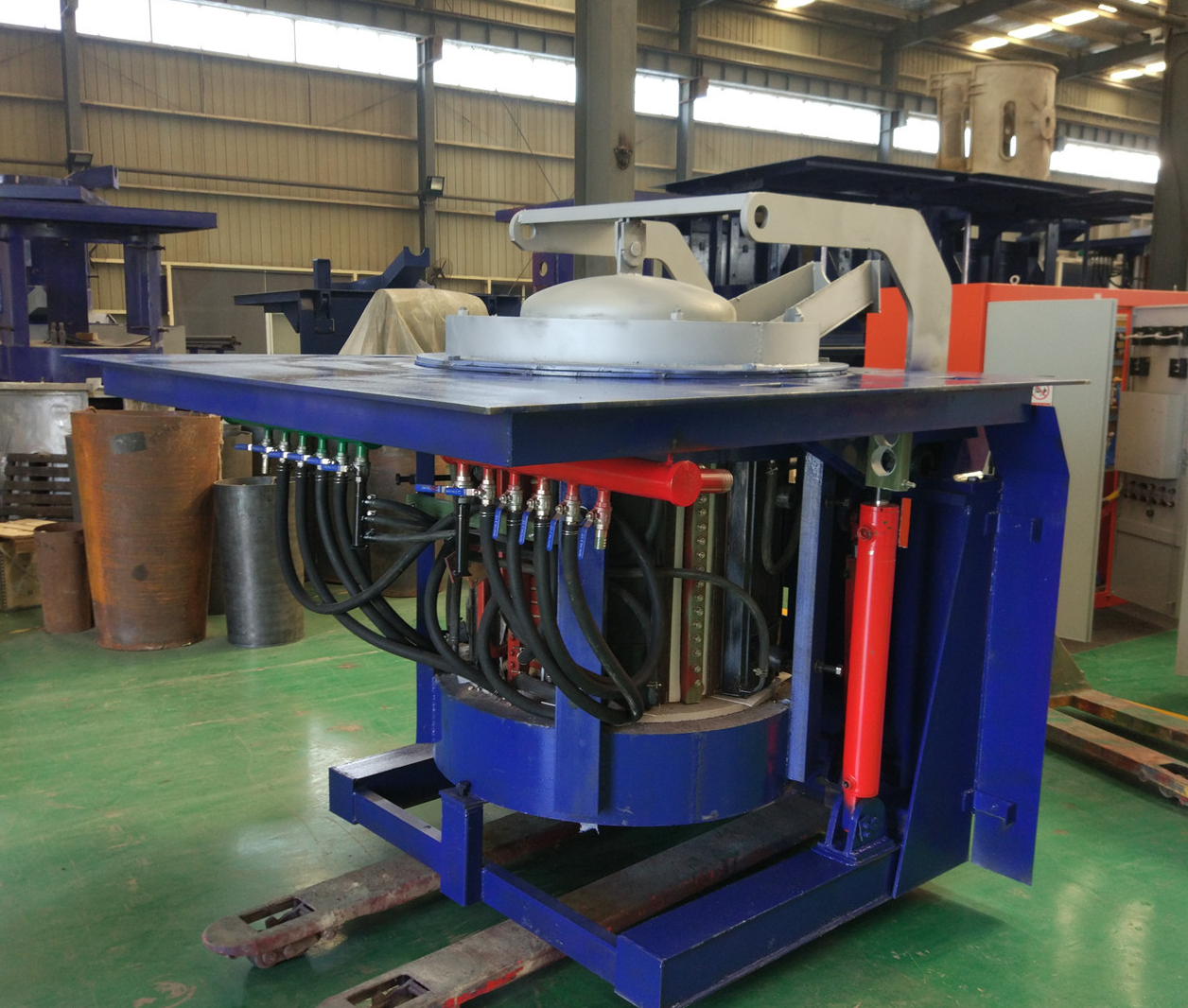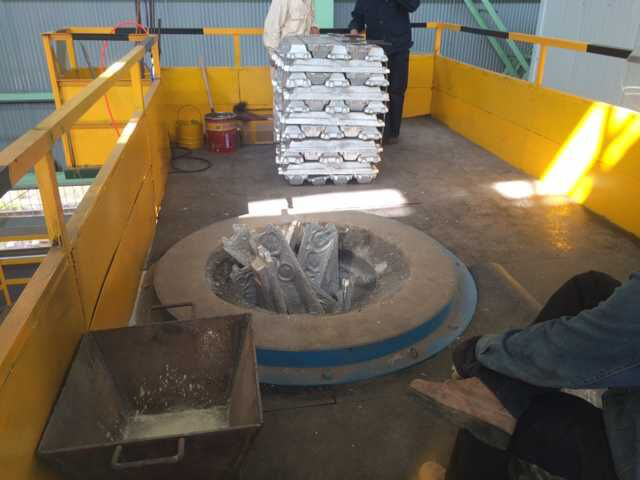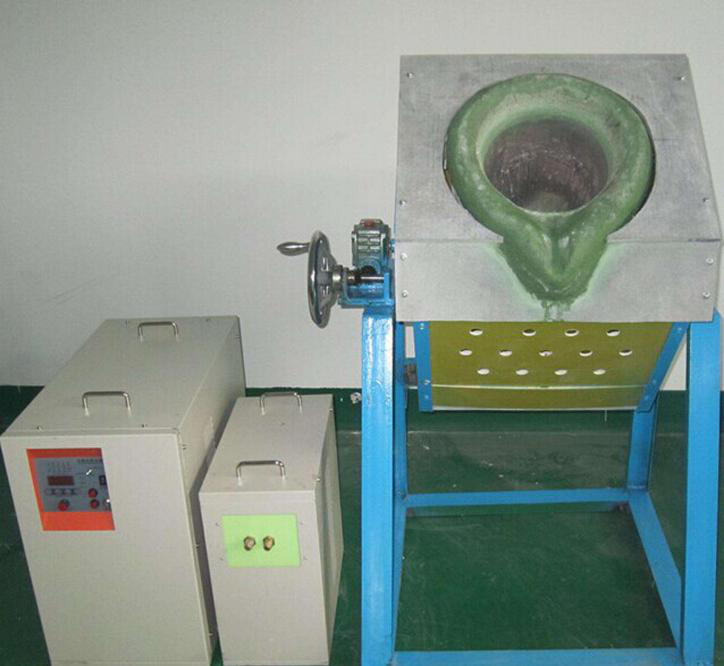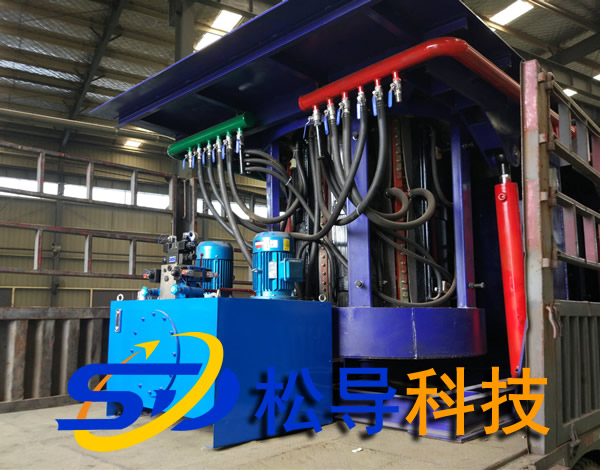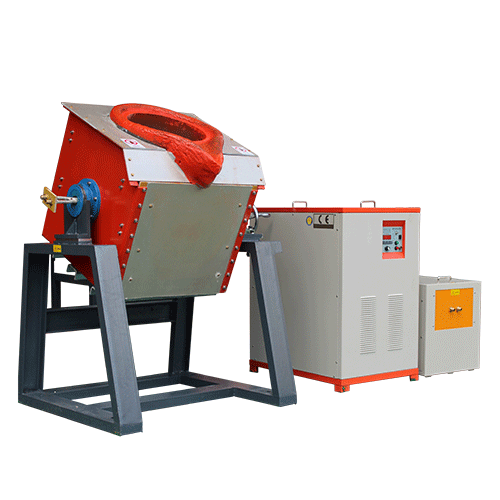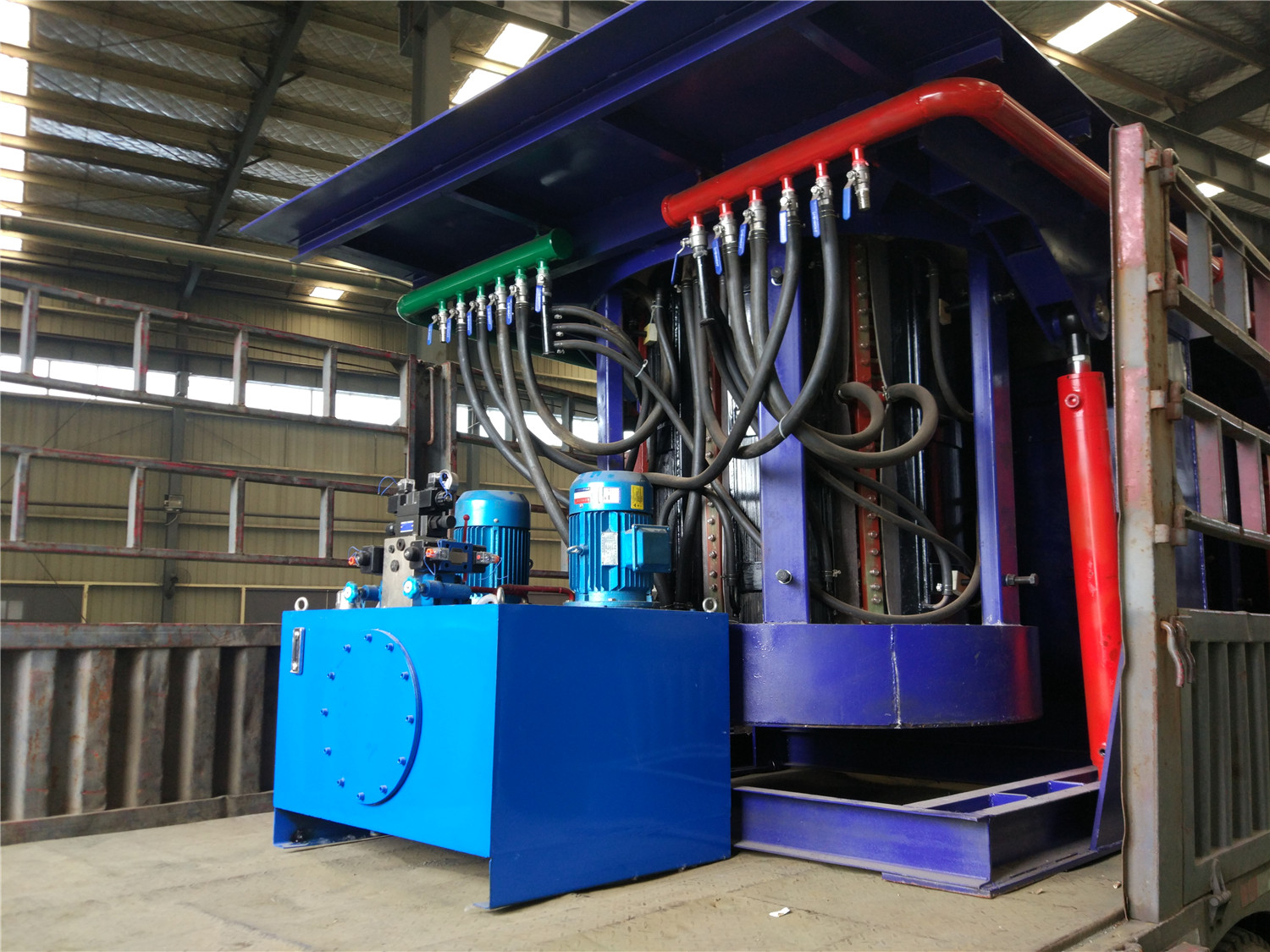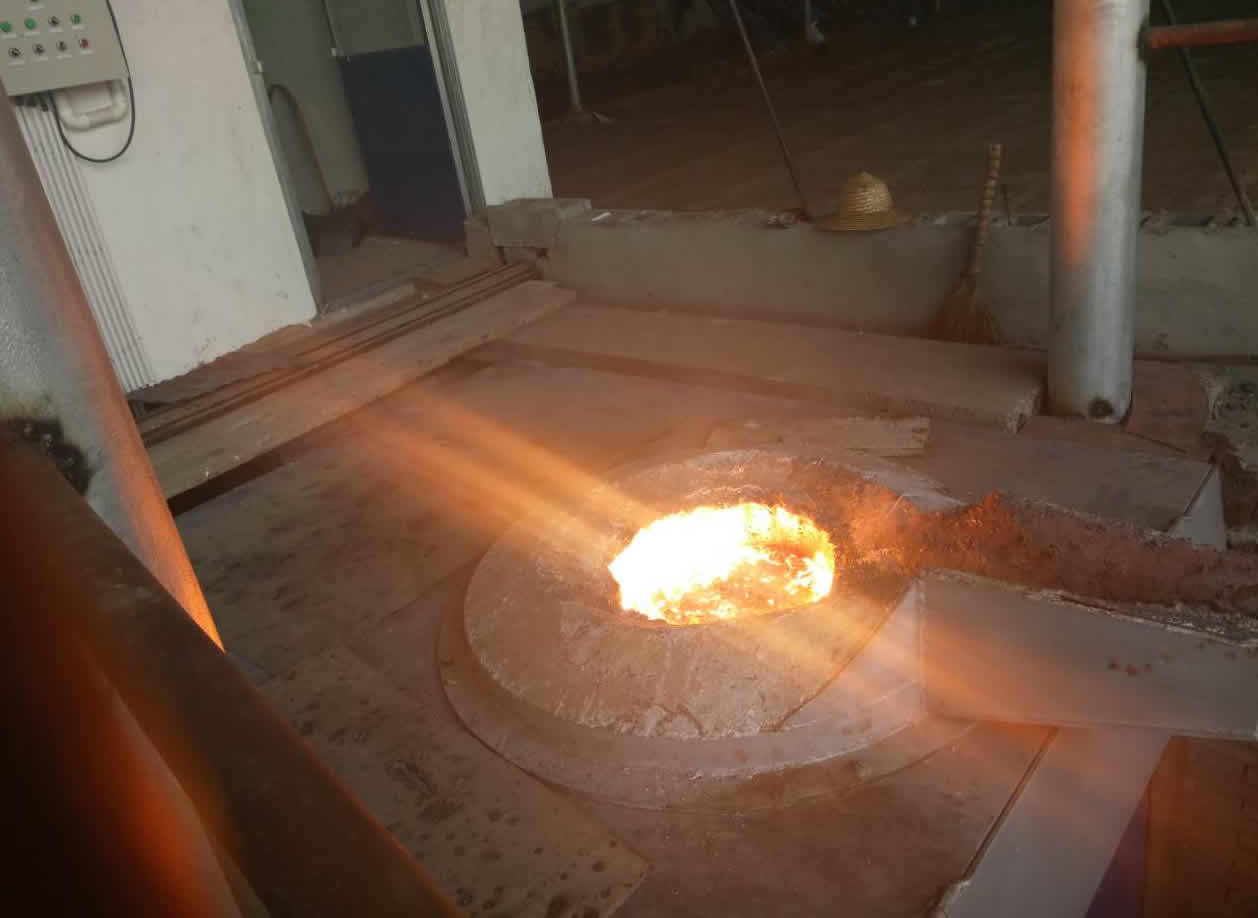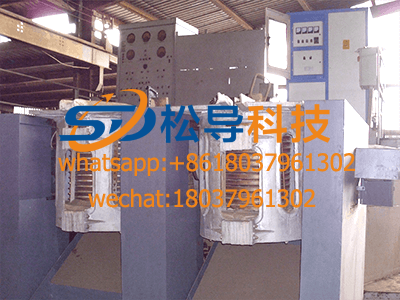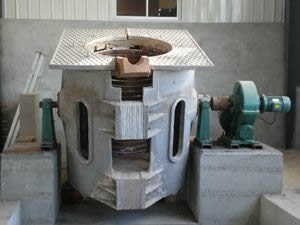1. Sucker rod heat treatment line material gantry (including baling device, disc feeder): The loading gantry is to stack the steel pipes to be heated, the gantry is thick 16mm steel plate and 20#, hot rolling mill The word steel is welded, the table top is 200mm wide, and the table top is set at 3° slope. 20 pieces of φ159 steel pipe can be placed. The gantry and the column are welded. When working, the crane hoist the whole bundle onto the gantry and manually unbundle. . The baling device is driven by a cylinder. As soon as the command is turned on, the bundle support is opened and the steel pipe is rolled to the disc feeder. The disc feeder has a total of 7 disc reclaimers on the same axis. When the command is given, the steel pipe needs to be heated, and it will automatically roll to the end of the gantry according to the beat (ie time), in the V-groove. The middle position is stopped.
.2, sucker rod heat treatment line feed flip mechanism: the feed flip mechanism and the lever type flip puller work the same, the purpose is to transfer the workpiece from this station to another station, but the structure is fundamentally different, work The principle is very different. The flipping mechanism is to hold the material smoothly, and put the material down smoothly, with good alignment, no impact and impact. There are a total of 9 turning plates, all arranged, and the working surface is inclined by 3° from high to low. It is driven by φ250 by 370 stroke cylinder. When the working pressure is 0.4Mpa, its tensile force is 1800kg, which is 3 times that of the heaviest steel pipe. The connecting rod and the tie rod are connected by hinges between the flip and the flip, and 9 turns when working. At the same time, the synchronization is good.
.3. Sucker rod heat treatment line V-type roller conveyor system:
.3.1. The roller conveyor system consists of 121 sets of independently driven V-rollers. There are 47 V-shaped rollers on the quenching and normalizing line, 9 sets of V-shaped rollers for fast feeding (including inverter), 24 sets of heating spray V-shaped rollers (including inverter), 12 sets of quick-rolling rollers (including inverter ). The power is driven by a cycloidal pinwheel reducer, model XWD2-0.55-57, the speed of the fast-rolling roller is 85.3 rpm, the forward speed is 50889 mm/min, and the steel pipe passes 19.5 seconds to reach the end point. There are 37 sets on the tempering line, 25 sets of heating V-shaped rollers (including inverter), 12 sets of quick-lifting rollers (including inverter), and the power adopts cycloidal pinwheel reducer, model is XWD2-0.55-59, quick lifting The roller speed was 85.3 rpm, the forward speed was 50889 mm/min, and the steel pipe passed 19.5 seconds to reach the end point. There are V-shaped rollers between the two cooling beds, all of which use fast rollers. The V-shaped rollers are installed on three production lines and are arranged at 15° on the same center. The distance between the V-shaped roller and the V-shaped roller is 1500 mm, and the diameter of the V-shaped roller is φ190 mm. Except for the V-shaped idler at the feeding end (the feeding end is cold material), all other V-shaped roller rotating shafts are provided with cooling water devices. The roller support uses a spherical bearing with a stand. Inverter motor speed control, with inverter, speed adjustment range of 38.5 rev / min ~ 7.5 rev / min. The conveying forward speed is 22969mm/min to 4476mm/min, and the steel tube rotation range is: 25.6 rpm to 2.2 rpm.
3.2. The heat treatment line of the sucker rod is calculated according to the annual output requirement. The output per hour is 12.06 tons, and the forward speed of the steel tube is 21900mm/min to 4380mm/min.
3.3. The result: the forward speed of the scheme design meets the production requirements.
3.4. Control the speed of the variable frequency motor through the inverter, and the time is about 3 seconds to make the end of the steel pipe meet. 2.3.5 The normalized and quenched steel pipes are smoothly entering another station. When the end of the steel pipe leaves the last spray ring, the head of the steel pipe enters the fast rolling race. The inverter controls the steel pipe that is connected end to end in about one second and will automatically separate and reach the end to enter the next station.
3.6. After the normalizing and tempering steel pipes, in order to enter the cold bed in time, when the tail end of the steel pipe leaves the exit of the last section of the inductor, the head of the steel pipe enters the fast rolling raceway, and the frequency converter controls the first and last ends of the steel pipe. Quickly separate, reach the end, and enter the cooling bed through the flip mechanism.
3.7. Floating pressure roller: The floating pressure roller and the transmission V-shaped roller are combined, and each set of sensors is installed at the front end. There are 4 sets of normalizing and quenching, and 3 sets of tempering, a total of 7 sets. Due to the fast transfer speed, it is set to prevent the radial runout of the steel pipe from damaging the sensor. The floating pressure roller can be adjusted, and the range is suitable for steel pipes of various specifications. The gap between the steel pipe and the upper wheel is 4 to 6 mm, which is manually adjusted.
3.8 tempering sensor moving device: When the steel pipe is in the normal fire, in order to make the steel pipe smoothly enter the cooling bed, the tempering sensor must be evacuated from the production line. The tempered sensors connected together are removed from the production line by three sets of φ100×1000 cylinders. The stroke does not need to be adjusted, and the center of the track is the center of the sensor.

